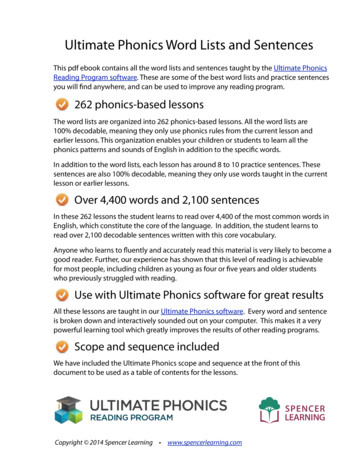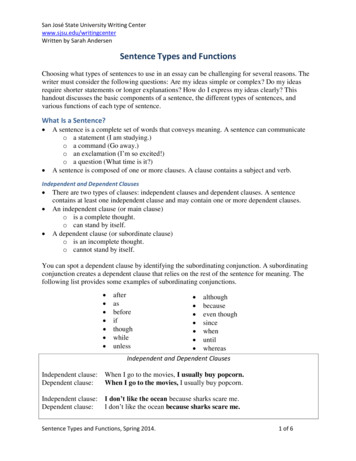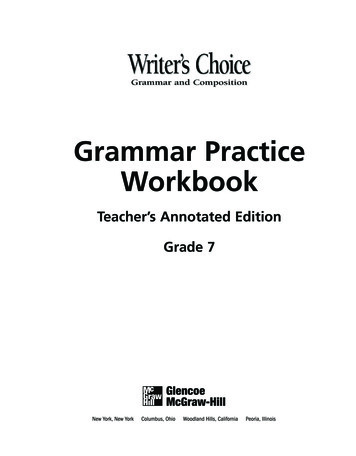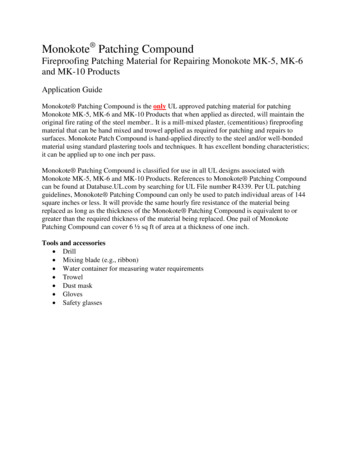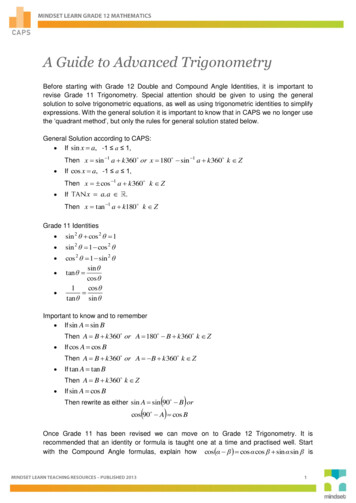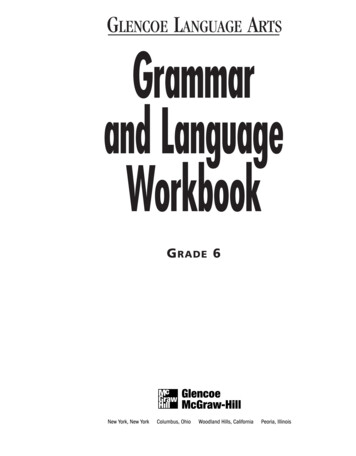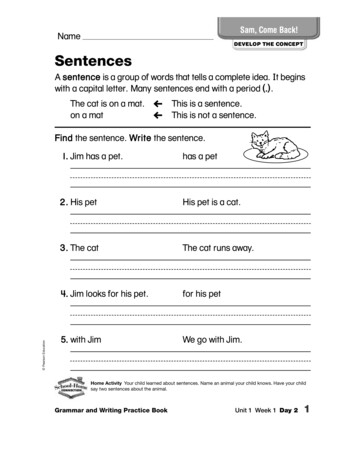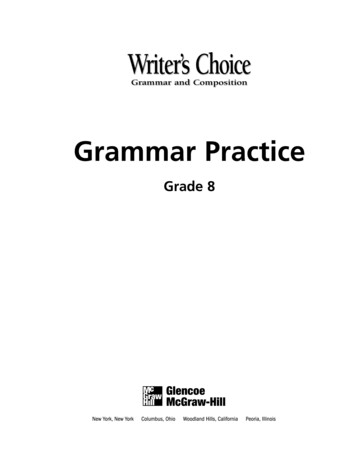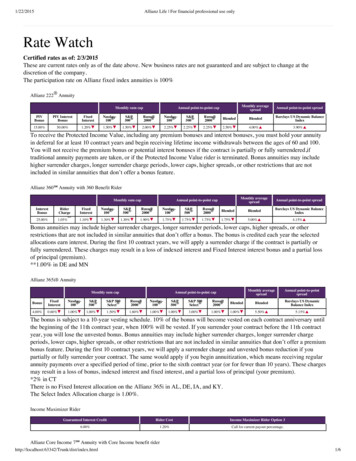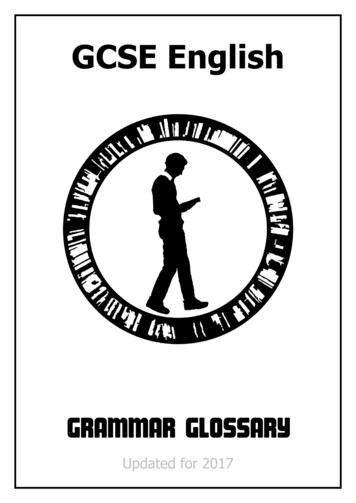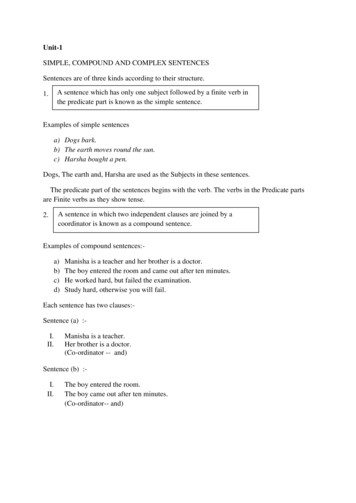
Transcription
Unit-1SIMPLE, COMPOUND AND COMPLEX SENTENCESSentences are of three kinds according to their structure.1.A sentence which has only one subject followed by a finite verb inthe predicate part is known as the simple sentence.Examples of simple sentencesa) Dogs bark.b) The earth moves round the sun.c) Harsha bought a pen.Dogs, The earth and, Harsha are used as the Subjects in these sentences.The predicate part of the sentences begins with the verb. The verbs in the Predicate partsare Finite verbs as they show tense.2.A sentence in which two independent clauses are joined by acoordinator is known as a compound sentence.Examples of compound sentences:a)b)c)d)Manisha is a teacher and her brother is a doctor.The boy entered the room and came out after ten minutes.He worked hard, but failed the examination.Study hard, otherwise you will fail.Each sentence has two clauses:Sentence (a) :I.II.Manisha is a teacher.Her brother is a doctor.(Co-ordinator -- and)Sentence (b) :I.II.The boy entered the room.The boy came out after ten minutes.(Co-ordinator-- and)
Sentence (c) :I.II.He worked hard.He failed the examination.(Co-ordinator -- but)Sentence (d) :I.Study hard.II.You will fail.(Co-ordinator -- anishaThe boyPredicateis a teacherentered the roomandandSubjecther brother(he)c)Heworked hardbut(he)d)(You)Study hardotherwiseyou3.Predicateis a doctorcame out afterten minutesfailed theexaminationwill failA sentence which consists of a main clause (an independent clause) and one or moresubordinate(dependent) clause is known as a complex sentence.Examplesa)b)c)d)a)b)c)d)Doctors claim that cancer is curable.Students stood up when the teacher entered the classroom.The teacher punished the student who told a lie.Thieves left the place as soon as they saw the police.Main or Independent ClauseDoctors claimStudents stood upThe teacher punished the studentThieve left the placeSub-ordinate or Dependant Clausethat cancer is curablewhen the teacher entered the class room.who told a lie.as soon as they saw the policeACTIVITY-1There are five simple sentences, three compound sentences and two complex sentences in thefollowing passage. Write, simple, compound or complex.1. Life is a bed of thorns.
2. It is never a bed of roses.3. Man struggles hard to earn his living.4. He runs after money and wants to enjoy power.5. In the race for money and power he gets hurt.6. Fears, worries and frustration hurt his mind.7. He becomes restless and loses peace of mind.8. He realises that money is not everything in life.9. It gives temporary satisfaction, but robs him of peace and happiness in life.10. What makes man happy is contentment.ACTIVITY-2Separate the subject from the Predicate in the following sentences.1.2.3.4.He had no answer to my question.Serpents move very fast.Constant illness compelled him to discontinue his study.Gardening, collecting stamps, drawing pictures, making paintings, catching fish,taking photographs etc., are the examples of common hobbies.5. The temporary sheds and stalls for the sellers in the market collapsed in the recentrain.The following are the main patterns of the simple sentences in English.PATTERN-1SVSUBJECT VERBExamples:a) Fire burns.b) Gold glitters.c) The child cried.d) The moon is shining.PATTERN-2SVOSUBJECT VERB OBJECTExamples:a) The teacher praised the studentb) We bought a new car.c) She sang a Meera bhajan.d) Valmiki wrote the Ramayana.
PATTERN-3SUBJECT VERB (INDIRECT) OBJECT (DIRECT) OBJECTSVOOExamples:a)b)c)d)Grandma told me a fairy tale.The postman gave me a letter.His father bought him a laptop.The teacher asked the students a simple question.PATTERN-4SVCSUBJECT VERB COMPLEMENTExamplesa)b)c)d)e)The child appears innocent.She feels cold.She looks beautiful.Munabhai became a doctor.Father is tried.PATTERN-5SVOCSUBJECT VERB OBJECT COMPLEMENTExamplesa)b)c)d)We elected Mr. Mohanty Chairman.Noble deeds make a person immortal.Modern scientists have proved the theory wrong.Police found the man guilty.ACTIVITY-3The sentences in the following passage are in different patterns. Identify the pattern of eachsentence and mention the pattern against the respective sentence.1)2)3)4)5)6)7)I have read theRamayana.Maharshi Valmiki wrote this famous epic.It deals with the life and work of lord Ramachandra.He was the son of Dasaratha of Ayodhya.It also tells us the story of Ravan, the demon king of Lanka .People called Ramachandra Purushottam.He was an incarnation of God.
8) Ravan was a great politician.9) Ramachandra, his wife Sita and brother Laxman went to forest.10) King Dasaratha died.11) Bharat became the king of Ayodhya.12) But he respected his elder brother Ramachandra.13) He regarded him God.14) Ravan in disguise kidnapped Sita.15) The bird Jatayu saw it.16) It gave the two grieving brothers this news.17) Ravan was very arrogant.18) He did not listen to Ramachandra’s request.19) He did not leave Sita.20) Ramachandra invaded Lanka.21) Bibhisan, Sugrib, Hanuman and their men helped Ramachandra.22) Ramachandra killed Ravan and rescued Sita.ACTIVITY-4TASK FOR WRITINGWrite a paragraph about how you celebrated your birthday. The sentences in the paragraphshould follow different sentence patterns.ACIVITY-5Write a letter to your friend telling him/ her about your visit to a historical place. Use alltypes of sentences in the letter.PATTERNS OF OTHER SENTENCE TYPESInterrogative sentences:Yes/No- Type Questions (The answer is either ‘yes’ or ‘no’.)Example: Did you call me? (AUX S V O)Are you ready? (AUX S C)Do you know him? (AUX S V O)‘Wh’ Type Questions (the answer contains information) Who is sitting there? What is your father’s name?
When did the office open? How did the patient die? Where are you going?Imperative Sentences Switch off the light. (V O) (Instruction)Please take it. - (request)Close the door (order)Let’s go for a walk (suggestion)Rise early in the morning (advice)Pass me the salt (V O O) (Order)In the above sentences, the verbs are used in their base form. The sentences can also be madenegative.For example: Don’t tell a lie (order) Please, don’t insult your friend (request) Don’t do anything in haste. (Advice) Don’t jump into any early conclusion.Exclamatory SentencesExclamatory sentences express ‘surprise’, ‘admiration’, ‘sorrow’, and other feelingsemphatically. Such sentences usually begin with ‘How’ or ‘What’. An exclamation mark (!)is put at the end of the sentence.Examples: What a beautiful flower it is ! How fast time flies ! What an excellent dancer she is ! How excellently she dances !Negative Sentences (Use of Negative Markers ‘not’ and ‘never’)He cannot climb a tree.She does not support her husband.I don’t watch television.Gopal doesn’t take fish.She never takes tea.Rahul has not eaten anything since the morning today.
ACTIVITY- 6Rewrite the following passage by changing the sentences into negatives.The monitor of our class enjoys good health. He has a pleasing appearance. He is welldressed. He looks very smart. He is intelligent and well-behaved. He respects all the teachers.He helps the class teachers in keeping discipline in the class. At the end of each period hecleans the blackboard. He is friendly to all. All the teachers like him. All the students lovehim dearly.ACITVITY-7Write ten sentences in column-A about what school students generally do on the day ofGanesh Puja. Then in Column-B, write ten sentences about what the students did not do onthat day this year in a particular school.(One example is given for you)1Column-AStudents decorate the school campus.Column-BThis year , the students of XYZ school didnot decorate the campus.2345678910ACTIVITY-8Write the questions to get the following sentences as answers. (the first one is done for you)1. Everyone makes mistakes sometimes.(Ans:- Who doesn’t make mistakes? )2. God will not forget to see the evil.3. It is most proper to disobey the traffic rule.
4. He saw me in the market .5. He asked me for something.6. The Prime Minister opened the Exhibition.7. Dr. Panda gave this medicine.8. Sanjay told the stories to Dhritarashtra.9. No, he has not invited me.10. I am his elder brother.11. There are five big trees in our school campus.12. Seven days make a week.13. I never sleep in day time.14. Father is not present at home now.15. The dress looks gorgeous.16. He is not a story teller.17. I am not a little tired.18. She doesn’t take tea.19. She can’t speak, because she is a dumb20. He asked why I came.ACTIVITY-9Frame exclamatory sentences for the following expressions. (the first one is solved for you.)1.2.3.4.5.6.Night is very beautiful. (Ans :- How beautiful is night !)She has an attractive face.It is very stupid of me to forget your name.It is a horrible accident.He managed the event efficiently.This is a beautiful park.ACTIVITY-10TASK FOR SPEAKINGWrite a dialogue between two students about their preparation for the forthcomingexamination. Use different sentence-types (interrogatives, negatives, declaratives,imperatives) in the dialogue.You may use the following sentences at necessary points in the dialogue.1.2.3.4.5.6.Oh !Well, it is a simple subject.Oh ! No, it is really hard.Yes ,it is interesting.How sad ! I don’t remember these simple things.No, I don’t like them.How is that?
7. Alas ! I have lost the class note8. How can I?9. What’s important in Time.10. Oh yes, I like it11. For Heaven’s sake, don’t say that12. Its time taking. I have no time13. Yea, easy questions first.14. Don’t do so15. Please tell me some important points only.16. Best of luck.COMPOUND SENTENCESCo-ordinators or co-ordinating conjunctions are used to join two independent clauses in thefollowing compound sentences.Co-ordinatorsCompound Sentences1andThe students listen attentively and take notes carefully.2butHe tried hard, but he failed. / Man proposes, but Goddisposes.3yetHe is illiterate, yet he is very polite.4stillIt is a holiday; still some officers have come to office.5orYou may agree to the proposal or give your own.6soMother is ill: so you find me in the kitchen.7neverthelessFather is tired, nevertheless he insists on hard work.8thereforeThe child is hungry, therefore it is crying.9otherwiseWork hard, otherwise you will fail.10 forI could not attend your call, for I was busy in office.11 either.orEither you personally attend the function or sendsomebody to represent you.12 neither.norA villain neither speaks truth nor accepts others wordsare true.13 not only.but alsoRanjeeta not only dances well but also sings nicely.14 norHe did not attend the reception, nor did he send any ofhis family members to the occasion.ACTIVITY-11Make compound sentences by combining a clause from Coloumn-1 and another suitableclause from Column-3 with an appropriate conjunction from column-2Column 1He is outwardly strict,Work hard,United we stand,Do,He is very ill,Column 2AndButNorStillYetColumn 3Delivered the letter.We stayed indoor.Takes teaI decided to help you.Pretends madness.
The postman came,It rained heavily,He smokes cigarettes,I was angry with youHe is mad,Do it,He is poor,He makes a promise,He is weakEither orNeither.norNot ou will fail.Lenient at heartI shall fine youHe is honestKeeps itDivided we fallDieHe takes restHe works hard.COMPLEX SENTENCEA complex sentence has two parts:The main clause and the subordinate clause.These parts are interchangeable. It means that a complex sentence may begin with either themain clause or the subordinate clause. In some cases, the main clause is split by thesubordinate clause in the middle.A) Main ClauseFIRST PART: Main clause/Independent clauseYou are the first manI have nothingYou need not askI finished the answerIt is trueI knowI do not knowNobody can sayI always wonderHave you seen a fishThe more you readSmita sangNobody will be allowed to enter thehallGive me some waterThe woman criedHe came oftenerTell meThisLife isThere is no meaning inSECOND PART: SubordinateClause/Dependent Clausewho heard the news.that I can offer.who I am.as I had no time left.that all that glitters is not gold.where he was born.how he passed without hard work.what will happen after hundred years.when I look at the vast sky.which flies in the sky.the more you learn.as if she were an expert playback singer.unless he has a ticket.that I may drink.as loudly as she could.than we expected.where you live.where I live.what we make it.what you say.
B) Subordinate Clause in the beginning:(First part)Subordinate clause/Dependant ClauseThough the load was light,As the decision has already been takenThough he got the newsIf you had not helped meIf you do not work hardThough I was angryThough he is poorUnless you work hard(Second part)Main Clause/Independent Clauseit was too much for the old man.the arguments are uselesshe was not happyicould not have done the work.you will fail.i did not punish him.he is honest.you cannot get success.C) The Split Main Clause:First Part of MainClausePeopleThe speakerThe Subordinate Clauseall the blessingsA friendwe enjoywho helps you in time ofneedthat climbs too highthat are honestHeServantsWho live in glass housesWho was a learned manThe rest Part of the mainClauseShould not throw stones.spoke about the nanotechnology.come from God.is a real friend.is sure to fall.are trusted.ACTIVITY-12Pick out the complex sentences from the following passage. Then break up each of thecomplex sentences into separate clauses. Mark the main clause as M.C and the subordinateclause as Sub C. (the first one is solved for you.)Gotipuas are boy dancers who dress as girls. They are the products of the ‘akhadas’ orgymnasia which were set up by the King Ramachandra Deva in Puri. These akhadas providedmilitary training to young men who would protect the town and the temple from intruders.The akhadas were like clubs, the main concern of which was gymnastics or the art of selfdefence. Those akhadas also served as nurseries where gotipua dancers were trained.Gotipuas were also known as ‘akhadapilas’ because the boy dancers were generated by theakhadasystem.There is another reason which explains the emergence of the gotipua traditionin Odisha. There was a time when the Vaishnava religion did not approve of dancing bywomen in temple. So, the practice of dancing by boys dressed as girls was introduced. Thegotipua dance had strong connection with what the maharis offered. The dance style ofgotipuas existed independently, although it had common roots with the dance style of themaharis. The Odissi dance of today has grown from both these traditions, which areassociated with Raja Ramachandra Deva.
ANSWER:1. Gotipuas are boy dancers----M.Cwho dress as girls---------------Sub C2. -------QUESTION-TAGSStudy the following sentences.“It’s very hot, isn’t it?”This sentence consists of a statement and a short question separated by a comma. The shortquestion is called a question tag.The question tag is generally used in spoken English, and informal writing.The Question Tag has two purposes:1. To attract the attention of the listener and2. To get the listener’s confirmation of the statement.Rules of Question Tag:1. A positive (affirmative) statement takes a negative tag.2. A negative statement takes an affirmative or positive tag.Examples: It’s raining heavily, isn’t it? It’s not raining, is it? He doesn’t take tea, does he ? He takes tea, doesn’t he? You called me, didn’t you? You didn’t call me , did you? Shyam is not a dancer,is he? Shyam is a dancer, is he?
Pattern of the Question Tag when the statement is affirmative or positive:Auxiliary n’t Subject pronounPattern of the Question Tag when the statement is negative:Auxiliary Subject pronounOther IMPORTANT POINTS about the formation of question tags:I.II.III.IV.The question tag is made up of an auxiliary and a subject.The auxiliary is the same as in the statement.A question tag is always separated from the statement by a comma.There are some semi-negative words which are used as negative markers in thestatements such statements take positive question tags.Examples:Few persons were absent, were they?They hardly come here, do they?I seldom take tea, do i?She rarely visits the theatre, does she?V. Imperative statements (both affirmative and negative)Take will you? as the question tag.Examples:Open the door, will you?Don’t open the door, will you?(there is no change in the question tag.)VI.Everybody or Everyone in the subject position in the statement is treated as plural forthe purpose of question-tag. So such statements take plural question tag.Examples:-VII.VIII.Everybody condemns the matter, don’t they?Everyone praised him, didn’t they?When the imperative statement implies suggestion, in “Let’s------ ” or “Let me---”Pattern, the question tag is “shall we?” or “shall I”Examples:Let me drive your new car, shall I?
Let’s arrange a tea-party, shall we?ACTIVITY-13Rewrite the following, adding appropriate question tags.1. It rained last night.2. She doesn’t like to come here.3. We are leaving tomorrow morning.4. She likes to share her breakfast with friends.5. This is a difficult problem.6. This camera costs twenty eight thousand rupees.7. The chief speaker gave an inspiring speech.8. Everybody in the stadium cheered the player.9. Remember to switch off the light and fans before leaving the room.10. None of the spectators liked the show.11. I am not happy.12. I am prepared for the examination.13. Everybody in the class shouted.14. Let me read out the letter for you.15. You need not worry about us.PREPARATORY (DUMMY) “IT”Study the following sentences.I.II.To carry the argument too far is easy.It is easy to carry the argument too far.In the sentence (i), the subject is “to carry the argument too far”. This is an infinitive phrase.In the sentence (ii) the subject is ‘It’. The construction with preparatory it is preferred whenthe subject is an infinitive phrase.The following sentences follow the pattern of preparatory ‘It’ construction. It is easy to learn Hindi.It is not good to spend money unnecessarily.It is impossible to live without water.It is risky to ride without a helmet.It takes five minutes to reach the market.It is kind of you to help us.Dummy ‘It’ is also preferred when the subject is a clause. Look at the following sentences.
I.II.It is true that the river Mahanadi is going to be dried.That the river Mahanadi is going to be dried is true.‘It’ construction is preferred for the purpose of emphasis.Examples:i. It was in the lawns that the party was held.ii. It is her purse that she is looking for.iii. It was in the evening that the accident occurred.ACTIVITY-14Rewrite the following sentences using the preparatory ‘It’1. To satisfy the customer is difficult2. To try again could be useless.3. To behave like this is disgraceful.4. To see you again was so nice.5. To believe him was wrong.6. To find a suitable job is not easy.7. To keep quiet is wise.8. To take a decision in critical situation is not easy.9. To advise others is easy.10. To put the sermons into action is difficult.ACTIVITY-15Rewrite the following sentences using the dummy it as the subject.1.2.3.4.5.That he will help us is unlikely.That the Chief Minister has resigned is a rumour.That she refused the offer of a good job is doubtful.That your wife left you is strange.That you did not attend the party is unfortunate.ACTIVITY-16Provide due answers to the queries in the following questions. The answers should be givenin the pattern of preparatory ‘It’ construction.( the first one is done for you.)1. Who was it that you were talking to?(Ans- It was Neha that I was talking to)2. What was it that they staged last evening?3. Who disturbed you in reading?
4. What is the film she has acted in?5. When did the last Nabakalebar take place?SENTENCES BEGINNING WITH ADVERBLook at the following sentence:i)Seldom does a barking dog bite.The sentence can be rewritten as :ii)A barking dog seldom bites.In the first sentence, an adverb takes the front position and hence there has been a inversionof the position of the subject and the verb.There are some adverbs such as: Hardly Scarcely Never Rarely SeldomThey are known as semi-negative adverbs. When they are used in the beginnings, thesentences follow the inverse-structure like the sentence (i)ACTIVITY-17Rewrite the following sentences using the adverbs in the front position.a)b)c)d)e)f)g)h)i)j)k)l)m)n)Ashok rarely visits his relations.Snigdha never likes non-vegetarian food.Chandan hardly writes to his father.I have never seen such a temple.Kalhandi district scarcely gets good rainfall.Newspapers seldom publish unbiased views.Swami Padmananda has never come out of his ashram during the last twenty years.They occasionally call on us.The man has never approached me.India will in no circumstances attack Pakistan.The superintendent seldom comes to hostel.She often arrives late for the class.I have hardly heard such nonsense.I shall on no account be held responsible.
GIVING SHORT ANSWERSStudy the following short answers to simple ‘Yes/No’ type questions.QUESTIONSSHORT ANSWERSAre you tired?Yes, I am.No, I am not.Did you call me?Yes , I did.No, I didn’t.Can you do it?Yes, I can.No, I can’t.Do you have a pen?Yes , I have.No, I don’t have.The pattern of short answer is:Yes Pronoun Auxiliary.Or No Pronoun Auxiliary N’t(not)ACTIVITY-18Answer the following questions, first in the affirmative and then in the negative.1.2.3.4.5.6.7.8.9.Did he meet you?Are you angry?Do you like fish?Can you swim?Do you smoke?Do you know her?Is he mad?Do you remember the story?Is it a fact?ADDITION WITHOUT REPETITIONStudy the following sentences.This year I went to see the Baliyatra.This year Gopal went to see the Baliyatra.This year Suman went to see the Baliyatra.Repetition is a fault in style. It causes annoyance in the readers.
Now read the below:This year I went to see the Baliyatra. So did Gopal and Suman.A) Affirmative additions to affirmative statements:The Pattern:-- So Auxiliary SubjectExamples:I booked tickets and enjoyed moving in a merry-go-round. So did Gopal and Suman.The headmaster was late for the school. So were the other teachers.Dahibara-Aludam tastes delicious. So do Thunkapuri and Chicken Pakoda.B) Negative additions to negative statements:The pattern:(Nor/Neither) Auxiliary Subject.Examples:Father does not take tea. Nor does my motherI can’t speak Hindi. Nor my sister.Gopal was not present. Neither was Suman.C) Negative additions to affirmative statements:The pattern: But Subject Auxiliary (n’t/not).Examples:I can speak Hindi. But my sister can’t.Some people obey the traffic rules. But some others don’t.He knows how to swim. But his brother doesn’t.D) Affirmative additions to negative statements:The Pattern:- But Subject Auxiliary.Examples:You don’t know Smita. But I do.Smita Does not know how to cook. But her husband does.Father doesn’t read the Gita. But my mother does.ACTIVITY-19Rewrite the following sentences avoiding repetition.1.2.3.4.Mother cooks well. Father also cooks well.Sulagna is a good dancer. You are a good dancer.I like her. He likes her too.Anup bought a new car. My brother also bought a new car.
5. Gagan is going to the market. I am going to the market too.6. Nutan is a good singer. Her sister is not a good singer.7. Our previous servant was not faithful. The present servant is also not faithful.8. Sonali went to the party. I did not go to the party.9. My great grandfather was a priest. My grandfather was also priest.10. My mother does not cook. My mother cooks.11. I won a gold medal. My brother won a gold medal too.12. My brother can play chess. But I can’t play chess.13. I don’t like orange. My parents don’t like Oranges.14. India is a secular country. Pakistan is not a secular country.TOO/SO/ENOUGHtoo (Adjective/Adverb) ‘to’ infinitiveso (Adjective/Adverb) ‘that’ clause(Adjective/Adverb) enough ‘to’ infinitive123Study the following sentences and look at their construction patternsPattern-1:Subject VerbHe isHe isMy son isThe child talksShe worked12345too (Adjective/Adverb)too weaktoo lazytoo youngtoo fasttoo slowlyto-infinitive, etcto walkto workto go to school.to be understood.to finish herhomework.Pattern-2:12345Subject VerbHe isHe isMy son isThe child talksShe workedso (adjective/adverb)so weakso lazyso youngso fastso slowly‘that’ clausethat he can’t walk.that he can’t work.that he can’t go to school.that it can’t be understood.that she couldn’t finish herhomework.Pattern-3:12Subject VerbShe isHe 3The police ranfastenoughto-infinitive, etcto lift the boxto understandthe track.to catch the
4she isoldenoughthief.to understandthe meaning.ACTIVITY-20Rewrite the following sentences without using ‘too’:1.2.3.4.5.6.7.It is too hot to work.The news is too good to be true.The guest is too impatient to wait.I am too poor to afford for my son’s education.The problem is too difficult to solve.It is too attractive an offer to reject.He reached the station too late to catch the train.ACTIVITY-21Rewrite the following sentences using ‘too’1.2.3.4.5.The sun is so hot for us that we cannot go out at present.The fact is so evident that it does not require a proof.I was so late that I could not hear the first speech.He is so honest that he will not accept a bribe.Mihir is so proud that he cannot learn.ACTIVITY-22Combine the sentences using ‘enough’:1.2.3.4.5.He is very strong. He can lift the iron box.Susant was hit very hard. He was knocked down.He is very tall. He can touch the ceiling.The boy is very clever. He can understand my non-verbal hints.The burglar ran very fast. He could escape the police.IF-CLAUSES: CLAUSES EXPRESSING DIFFERENT TYPES OF CONDITIONA) Some if- sentences express universal truth or scientific facts or general validity.Examples:If you heat iron, it expands.‘If’-clause (a comma) main clause.
The above sentence can be written by changing the positions of the clause. No comma is usedafter the main clause.Example:-Main clause ‘If ’ -ClauseReversing the positions of the main clause and if-clause does not harm the meaning ofthe sentences.The Pattern:‘If’ ClauseThe verb is simple present tense form.Main Clausethe verb in simple present tense form.B) Some if-sentences express that a particular action (mentioned in the if-clause) may ormay not produce a result(mentioned in the Main Clause). Here, the result is probableor more possible or likely to happen. This is called real condition.Example:- if we catch the train at 8 A.M, we shall reach the place before lunch time.POINT-TO-NOTEHere, catching train at 8 A.M is the action and reaching the place before lunch time is theresult which is desired. The result is probable or more possible (not guaranteed). Our desiremay or may not be fulfilled.The Pattern:‘if’ Clausethe verb in simple present tense formMain Clause(will/shall/can/may) VerbExamples:123456If it rains ,If you study hard,If anybody finds my money,If you tease a beast in a zoo,If the postman doesn’t findthe addressees house,If you agree,we’ll stay at home.you will get a first division.I shall give him/her a reward.it may react dangerously.he will take the letter back to the post office.we shall have a dinner at the New Plaza.C) There are some Improbable or Imaginary conditions. We often wish some improbablethings to happen. This is called unreal condition.Examples:If I were a bird, I could fly in the sky.(it is imaginary and unreal. A man can’t be a bird.)
The Pattern:If Clausethe verb in past subjunctive form or in simplepast tense form.Main Clause(would/could/should/might) VerbExamples:12if I were the Chief Minister,if I were Obama,3if you were a millionaire,I would abolish tax on fuel.I could annex the whole of Pakistan and Bangladeshwith India.how would you spend your money?D) There are some conditions which say that something did not happen because acondition was not fulfilled.Examples:i)ii)iii)if Pakistan had won the Kargil war, the whole of Jammu and Kashmir would havegone to her territory.If you had tried again, you could have succeeded.If the man had not teased the beast, it would not attacked him.POINTS TO NOTE:Sentencei)ii)iii)Which condition was notfulfilledPakistan did not win theKargil war.you did not try againthe man teased the beastwhat did not happen as thefinal resultthe whole of the Jammu andKashmir did not go toPakistan territory.you did not succeed.the beast attacked the man.This is called unfulfilled condition.The Pattern:‘If’ ClauseThe verb takes the past tense form.Main Clause(would/should/could/might) have (pastprincipal form of the verb.)Examples:1. If you had not reminded me, I would have forgotten to pay my fees.2. If the patient had taken the medicines regularly, he would not have fallen seriously ill.3. If you had driven carefully, you could have escaped the accident.
ACTIVITY-23Study the following pairs of sentences. In each pair, you’ll find a condition and its result.Determine the type of condition and mention it against each pair.Write either universal or Real or Imaginary or Unfulfilled.1. You didn’t invite Rahim to your birthday. So, he didn’t invite you to his birthday.2. It is impossible on my part to become an elephant. So, how can I possess a trunk?3. I didn’t notice my son’s mistake. So I didn’t check him.4. Light falls on a mirror. There is reflection of light.5. You look at mirror. You see your own face.6. Walk fast. You can reach the destination in time.7. Shyam had a degree. So he got a job easily.8. No one watere
14 nor He did not attend the reception, nor did he send any of his family members to the occasion. Make compound sentences by combining a clause from Coloumn-1 and another suitable clause from Column-3 with an appropriate conjunction from column-2 Column 1 Column 2 Column 3 H
